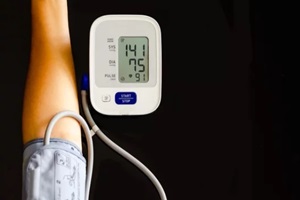 Hypertension, commonly known as high blood pressure, is a growing health concern affecting over a billion people globally. Characterized by the chronic elevation of blood pressure in the arteries, hypertension significantly increases one’s risk of heart disease, stroke, kidney failure, and other complications if not properly managed.
Hypertension, commonly known as high blood pressure, is a growing health concern affecting over a billion people globally. Characterized by the chronic elevation of blood pressure in the arteries, hypertension significantly increases one’s risk of heart disease, stroke, kidney failure, and other complications if not properly managed.
While various lifestyle and environmental factors influence an individual’s likelihood of developing hypertension, researchers have found that genetics also play a major role.
By understanding how hypertension runs in families, you can better evaluate your risk and take appropriate preventative steps.
The Genetic Component
Unlike rare genetic disorders caused by mutations in a single gene, the most common forms of hypertension stem from complex interactions between multiple gene variants and lifestyle/environmental triggers.
Each of these gene variants has a small individual effect, but collectively, they can influence key physiological pathways such as fluid balance, vascular resistance, and renal sodium handling to precipitate hypertension.
Though not fully understood, there also appear to be genetic factors that accelerate age-related blood vessel changes, further raising long-term cardiovascular risk.
Advances in genomic research have led to the discovery of hundreds of gene loci associated with blood pressure regulation and hypertension susceptibility.
Ongoing efforts to characterize the specific genetic architecture underlying hypertension in different patient subgroups promise to discover new molecular pathways that could be targeted to improve prevention, diagnosis, and treatment.
Still, much of the predicted “heritability” remains unexplained at a genetic level. So while DNA tests can quantify risk, family history serves as an accessible and low-cost “genetic test” to identify individuals who may warrant closer monitoring.
The Significance of Family History
 Several studies have shown that having one or more close blood relatives with hypertension dramatically increases your lifetime risk of developing high blood pressure.
Several studies have shown that having one or more close blood relatives with hypertension dramatically increases your lifetime risk of developing high blood pressure.
In particular, early-onset hypertension in a first-degree relative (parent, sibling, or child) is a strong predictor that other family members may also develop hypertension at an early age.
The exact risk varies based on the number and type of relatives affected as well as the age of onset, but some estimates suggest first-degree relatives of early-onset hypertension patients have a 2-4-fold greater lifetime risk compared to the general population.
Some of this amplified risk stems from shared genetic susceptibility, while some may also relate to common lifestyle and environmental exposures that can trigger or exacerbate hypertension.
Nevertheless, a thorough multi-generational family history can provide essential clues about your inherited risk long before warning signs appear.
Capturing this information early on and updating it over time enables healthcare providers to advise you on lifestyle modifications and medical monitoring that can mitigate that risk.
Using Family History to Assess Risk
With strong evidence linking family history to hypertension risk, taking a pedigree is now considered an essential component of routine primary care.
Constructing a basic three-generation pedigree is straightforward: it starts with you, as the patient, along with your siblings and parents, gathering important statistics and medical histories, then expands to include grandparents, aunts/uncles, cousins, and beyond.
Standardized symbols are used to efficiently map family relationships and the onset or causes of major health conditions.
Some warning signs in a family history that suggest possible hereditary hypertension risk include:
 Diagnosis of high blood pressure before age 55, especially in multiple family members
Diagnosis of high blood pressure before age 55, especially in multiple family members- Any relatives with extremely elevated blood pressure readings
- End-organ complications such as heart attack, stroke, or chronic kidney disease before age 60
- Need for three or more medications to control blood pressure
- Severe hypertension during pregnancy (preeclampsia/eclampsia)
Of course, family history is just one piece of the puzzle — but it can directly inform clinical recommendations regarding hypertension prevention.
Those flagged as higher risk based on pedigree analysis warrant more vigilant blood pressure screening, aggressive lifestyle changes if readings creep upward, and lower thresholds for initiating medical therapy.
Leveraging Genetic Insights
Family history assessment is an important part of primary care, but continuing advances in genomics are promising for even more individualized hypertension evaluation and management down the road.
As researchers pinpoint specific gene variants that modulate distinct physiological pathways affecting blood pressure, DNA-based risk profiling could one day help identify:
- Who is likely to develop hypertension, and how soon
- Who would benefit most from targeted lifestyle/environmental modifications
- Who should start medications earlier and at lower doses
- Who might experience side effects or poor response to certain treatment classes
In the meantime, exploring a family history of hypertension and updating pedigrees over time remains one of the most accessible and effective tools for assessing hereditary risk.
Identifying if you are at risk early and implementing lifestyle changes and closer monitoring can then help mitigate that risk, preventing or delaying onset.
Partner with Imperial Center Family Medicine on Your Hypertension Journey
 Managing hypertension risk in the context of genetic predisposition can be complicated, especially for those with a family history that indicates hereditary susceptibility. But you don’t have to attempt to manage it alone.
Managing hypertension risk in the context of genetic predisposition can be complicated, especially for those with a family history that indicates hereditary susceptibility. But you don’t have to attempt to manage it alone.
Imperial Center Family Medicine healthcare providers have extensive experience constructing pedigrees to evaluate hypertension risk, counseling at-risk patients on prevention, and personalized care planning.
If your family history raises concerns about possible hereditary hypertension, we are here to help you understand your risk and chart the best path forward.
Contact us today at 919-873-4437 or online to schedule a risk assessment and partner with our Durham, NC team to effectively manage your cardiovascular health for years to come.
